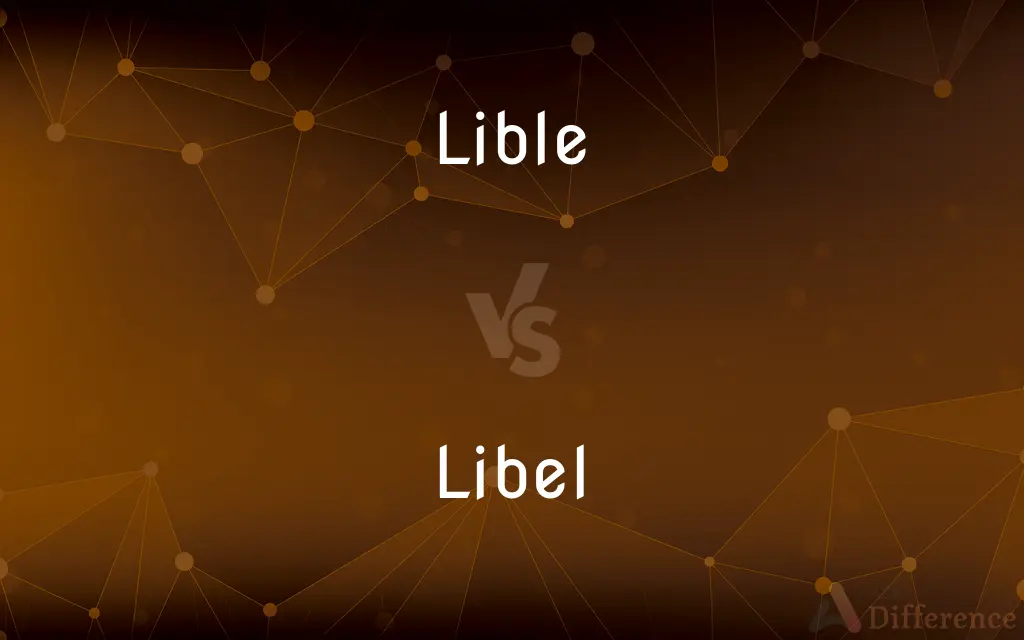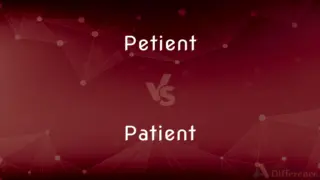Lible vs. Libel — Which is Correct Spelling?
By Tayyaba Rehman — Updated on March 28, 2024
Lible is an incorrect spelling, whereas Libel is the correct spelling referring to a written defamatory statement.

Table of Contents
Which is correct: Lible or Libel
How to spell Libel?

Lible
Incorrect Spelling

Libel
Correct Spelling
ADVERTISEMENT
Key Differences
Remember "lie" is in "libel" because it involves a false statement.
Consider "be" in the middle, as in "libel" is about someone being falsely accused.
Keep in mind that "libel" is about "li"terature that can "be" lying.
Note that "libel" sounds like "label," but with an "i."
Envision a "bell" ringing for truth, with "bel" in "libel."
ADVERTISEMENT
How Do You Spell Libel Correctly?
Incorrect: The newspaper faced a lible lawsuit for their incorrect information about the celebrity.
Correct: The newspaper faced a libel lawsuit for their incorrect information about the celebrity.
Incorrect: She wrote a damaging lible about her coworker on social media.
Correct: She wrote a damaging libel about her coworker on social media.
Incorrect: The judge dismissed the case as it was not considered lible.
Correct: The judge dismissed the case as it was not considered libel.
Incorrect: He was accused of lible after the article was published.
Correct: He was accused of libel after the article was published.
Incorrect: They feared the possibility of being sued for lible due to the controversial nature of their report.
Correct: They feared the possibility of being sued for libel due to the controversial nature of their report.
Libel Definitions
A written false statement damaging a person's reputation.
She sued the magazine for libel after they published untrue allegations.
To defame someone in writing.
The celebrity claimed the newspaper libeled him with the recent article.
Any written or printed form of defamation.
The attorney provided examples of the libels circulating online.
A published false statement that is damaging to a person's reputation; a written defamation
He was found guilty of a libel on a Liverpool inspector of taxes
(in admiralty and ecclesiastical law) a plaintiff's written declaration.
Defame (someone) by publishing a libel
The jury found that he was libelled by a newspaper
(in admiralty and ecclesiastical law) bring a suit against
If a ship does you any injury you libel the ship
The legally indefensible publication or broadcast of words or images that are degrading to a person or injurious to that person's reputation.
An incidence of such publication or broadcast.
The written claims initiating a suit in an admiralty court.
To publish or broadcast a libel about (a person).
(countable) A written or pictorial false statement which unjustly seeks to damage someone's reputation.
(uncountable) The act or tort of displaying such a statement publicly.
(countable) Any defamatory writing; a lampoon; a satire.
A written declaration or statement by the plaintiff of their cause of action, and of the relief they seek.
(countable) A brief writing of any kind, especially a declaration, bill, certificate, request, supplication, etc.
To defame (someone), especially in a manner that meets the legal definition of libel.
He libelled her when he published that.
To proceed against (goods, a ship, etc.) by filing a libel claim.
A brief writing of any kind, esp. a declaration, bill, certificate, request, supplication, etc.
A libel of forsaking [divorcement].
Any defamatory writing; a lampoon; a satire.
A malicious publication expressed either in print or in writing, or by pictures, effigies, or other signs, tending to expose another to public hatred, contempt, or ridicule. Such publication is indictable at common law.
The crime of issuing a malicious defamatory publication.
A written declaration or statement by the plaintiff of his cause of action, and of the relief he seeks.
To defame, or expose to public hatred, contempt, or ridicule, by a writing, picture, sign, etc.; to lampoon.
Some wicked wits have libeled all the fair.
To proceed against by filing a libel, particularly against a ship or goods.
To spread defamation, written or printed; - with against.
What's this but libeling against the senate?
[He] libels now 'gainst each great man.
A tort consisting of false and malicious publication printed for the purpose of defaming a living person
The written statement of a plaintiff explaining the cause of action (the defammation) and any relief he seeks
Print slanderous statements against;
The newspaper was accused of libeling him
A false publication that tarnishes someone's image.
The online post was a clear libel against the company.
A visual representation that harms someone's reputation.
The photoshopped image acted as a libel against the politician.
Libel Meaning in a Sentence
To win a libel case, the plaintiff must prove the statement was false and damaging.
The author was careful to avoid any statements that could be construed as libel.
The politician sued the newspaper for libel after they falsely accused him of bribery.
The magazine issued a retraction to avoid a libel lawsuit.
Libel involves written or published defamatory statements.
Writing a libel can have serious legal consequences.
Libel laws vary significantly from country to country.
A libel claim must show that the published material was not only false but also intended to harm.
Proving libel in a court can be a complex and lengthy process.
The editor reviewed the article for potential libel issues before publishing.
The journalist attended a workshop on how to avoid libel when reporting.
The libel case was settled out of court.
Accusations of libel must be taken seriously by publishers.
Online comments can also lead to libel charges if they are false and harmful.
The difference between libel and slander is that libel is written, while slander is spoken.
Celebrities often deal with libel from tabloids.
To avoid libel, always verify the facts before publishing.
A public apology was issued to settle the libel dispute.
The company was careful about what they published online to avoid libel.
Social media platforms can be breeding grounds for libel.
Public figures have a harder time proving libel because of their status.
Defending against a libel claim can be very expensive.
The lawsuit alleged libel due to a misrepresented quote.
Libel Idioms & Phrases
To cry libel
To claim that something is harmful and untrue about one's reputation.
The celebrity decided to cry libel against the magazine for their misleading article.
Libel in print
Referring specifically to written or published defamatory statements.
The book contained several instances of libel in print against public figures.
A shield against libel
Measures or precautions taken to protect oneself from being accused of libel.
Fact-checking every article thoroughly was their shield against libel.
A libel upon someone's character
A false statement that unfairly tarnishes someone's reputation.
The accusations were a libel upon the teacher's character, causing unwarranted distress.
The sting of libel
The harm or distress caused by defamatory statements.
The politician felt the sting of libel keenly and resolved to clear his name.
Libel-proof
Describing someone who cannot be harmed by defamation due to their already damaged reputation.
The disgraced official was practically libel-proof, with little reputation left to tarnish.
To wash one's hands of libel
To claim innocence or disassociate oneself from defamatory statements.
The publisher washed his hands of libel, claiming the author acted independently.
To be liable for libel
To be legally responsible for the publication of false and damaging information.
The blogger was found to be liable for libel after spreading unfounded rumors.
To sue for libel
To take legal action against someone for making harmful false statements.
He decided to sue for libel after the newspaper refused to retract the story.
Common Curiosities
What is the pronunciation of Libel?
It's pronounced as "LYE-buhl."
Why is it called Libel?
The term originates from the Latin "libellus," meaning a small book or document.
What is the root word of Libel?
The root is from the Latin word "libellus."
Which preposition is used with Libel?
"Of" as in "libel of slander" or "against" in the context of an accusation.
Which vowel is used before Libel?
Typically "a" as in "a libelous statement."
What is the singular form of Libel?
Libel.
What is the plural form of Libel?
Libels.
Which conjunction is used with Libel?
Any conjunction can be used based on sentence structure.
Is Libel an abstract noun?
Yes, as it denotes an idea or concept.
What is the verb form of Libel?
The verb form is "to libel."
Is Libel a noun or adjective?
"Libel" is primarily a noun, but "libelous" is its adjective form.
Is Libel a vowel or consonant?
"Libel" is a word containing both vowels and consonants.
Is the Libel term a metaphor?
Not inherently, but can be used metaphorically in context.
Is the word “Libel” a Direct object or an Indirect object?
It can be used as a direct object, e.g., "He filed a lawsuit for libel."
How do we divide Libel into syllables?
Li-bel.
Which determiner is used with Libel?
It can be used with various determiners like "this," "that," "my," depending on context.
What is the first form of Libel?
Libel.
Is Libel a negative or positive word?
Generally negative, given its association with false accusations.
Is the word Libel is Gerund?
No, but "libeling" is its gerund form.
What is a stressed syllable in Libel?
The first syllable, "Li."
Is Libel a countable noun?
Yes.
Is Libel a collective noun?
No.
Is the word Libel is imperative?
No.
How many syllables are in Libel?
Two syllables.
What is another term for Libel?
Defamation.
Which article is used with Libel?
Both "a" and "the" can be used depending on context.
Is Libel an adverb?
No.
What part of speech is Libel?
It's primarily a noun.
What is the second form of Libel?
Libeled.
What is the third form of Libel?
Libeled.
What is the opposite of Libel?
Truth or factual statement.
How is Libel used in a sentence?
"After reading the false accusations in the article, she decided to sue for libel."
Share Your Discovery

Previous Comparison
Tortise vs. Tortoise
Next Comparison
Petient vs. PatientAuthor Spotlight
Written by
Tayyaba RehmanTayyaba Rehman is a distinguished writer, currently serving as a primary contributor to askdifference.com. As a researcher in semantics and etymology, Tayyaba's passion for the complexity of languages and their distinctions has found a perfect home on the platform. Tayyaba delves into the intricacies of language, distinguishing between commonly confused words and phrases, thereby providing clarity for readers worldwide.













































